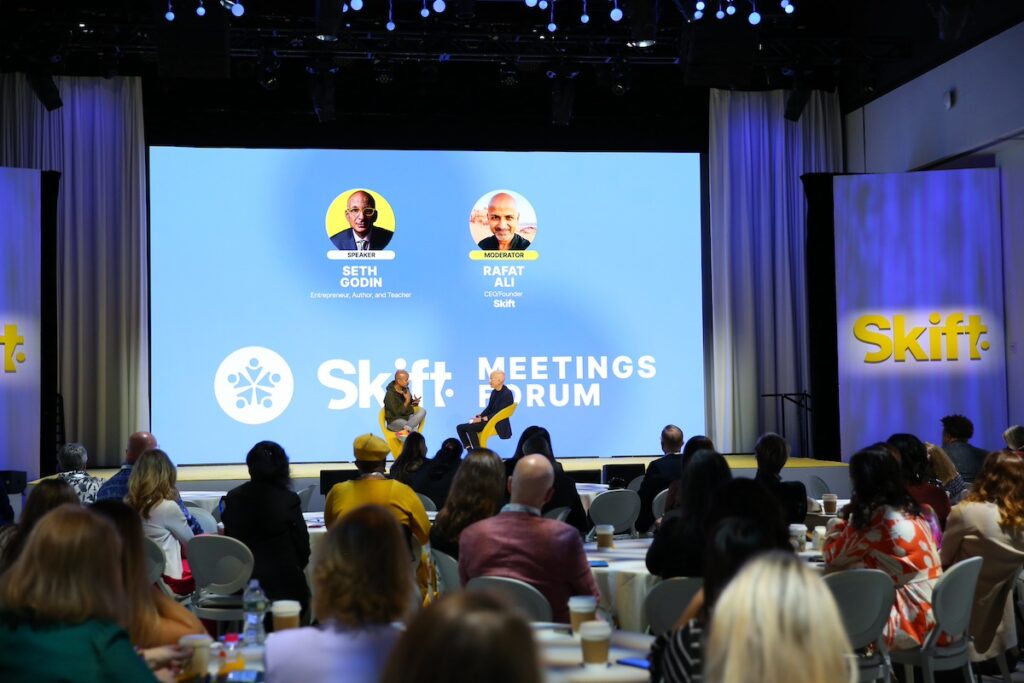
The Skift Meetings Forum wrapped up Tuesday in New York City. 250 attendees enjoyed exclusive access to industry VIPs who shared the latest industry trends.
The day started with marketing guru Seth Godin, who challenged the audience to question the status quo and transform their meetings.
“Why don’t meetings last 365 days, and for three of those days, we come together?” he asked the audience. Instead of the typical meeting, he suggested, why not cancel three of the most mediocre speakers and use that time instead to put people in teams and give them a problem to solve together in one hour as a group. “There will be some confusion and then it’s going to transform the people in the room.”
Lessons from TED
The afternoon keynote speaker, Monique Ruff-Bell, chief program and strategy officer at TED Conferences, shared the story of her journey working with the iconic brand and some tidbits from the annual TED conference in Vancouver, where attendees hear more than 80 TED talks in five days.
“You’re not only listening to Ted talks, then you go to something called ‘Discovery Sessions.’ We don’t call our sessions breakout sessions. We want to create experiences where you discover something about yourself – a new ability, a new way of thinking about that.
The speakers come off stage and sit right in the audience with you. “We also have speaker meetups every single day where you can ask all those burning questions to the speakers you just heard from.”
“So it’s not about just creating content, it’s about creating an immersive experience.”
Global Politics on the Agenda
Just 47 days separate Skift Meetings Forum from the U.S. presidential election, a timely session featuring Michael Dominguez, president and CEO of Associated Luxury Hotels International (ALHI), and Senthil Gopinath, CEO of the International Congress and Convention Association (ICCA), explored how geopolitics impact the meetings industry.
Both speakers agreed that the meetings industry will continue to move on, regardless of the election outcome. In fact, Dominguez said his attention was elsewhere. “I’m paying more attention to what happens in Congress and the Senate, because, candidly, that’s where the legislation will actually move through.”
Gopinath questioned why the industry keeps focusing on economic impact, when that is not what matters to politicians. “We tend to talk about why we are important, and the impact we create as an industry, but they are not interested in that. They want to identify what you’re bringing to their country, or their city, or what changes you can bring. So their decision-making process is primarily based on that.”
Visa wait times for visitors to the U.S. were also part of the discussion. The average wait in some countries is close to 400 days, and this remains a concern for planners relying on international audiences. “There are groups that have told us they are completely avoiding the United States right now because they have a large international contingency, and they can’t be guaranteed to get them here,” Dominguez said.
Addressing Industry Challenges
Highlights of Skift Meetings Forum included a panel with Ken Holsinger, senior vice president, strategy, Freeman; Carina Bauer, CEO, IMEX Group; and Sherrif Karamat, president and CEO, PCMA, built around the findings from the Freeman Trends Report about next-gen values, preferences and behaviors. The group spoke of how meetings must evolve, as IMEX has, said Bauer. “We’ve got a mega event where we bring everybody together, and then we create micro events and micro opportunities for people to connect with a small group of people. So you get that opportunity for the best of both worlds.”
In the “DEI at the Crossroads” session, Dr. Brandi Baldwin, CEO of Millennial Ventures, shared how important it is for companies to take a holistic approach. “If we are not putting diversity on our teams, if we’re not putting diversity on the stage at events, if we’re not putting diversity on committees that plan events, then what we’re doing is getting the same results over and over again.” ESG Advisor Bea Boccalandro, her co-presenter, was brutally honest about reverse discrimination, which she has experienced. “Reverse discrimination does not erase discrimination, it actually feeds it,” she said.
In a session focused on the challenges facing corporate events, Nicola Kastner, CEO of Event Leaders Exchange, and Rob Adams, CEO of Bishop-McCann, discussed various topics, including AI, sustainability and engaging the next generation of attendees.
The day’s panels were punctuated by individual interviews with Reggie Aggarwal, CEO and founder of Cvent; Ben Irwin, president and CEO of Encore; Melissa Riley, senior vice president of convention sales and services, Destination DC; and Caroline Godden, global brand leader, Sheraton Hotels & Resorts.
Networking a Priority
A question posed to the audience at the opening session found that Networking was the top reason people attend the Forum – and the organizers did not disappoint. During two Comparing Notes sessions, attendees broke out into small groups to brainstorm specific questions related to the speaker presentations. The light-filled common areas of The Glasshouse, which features floor-to-ceiling windows overlooking the Hudson River in lower Manhattan, were an inspiring setting for breaks and meals.
A group of attendees enjoyed a private tour of The Shed, an innovative performing arts venue with a moveable outer shell, located in the nearby Hudson Yards district. Everyone wrapped up the day with an elegant evening reception back at The Glasshouse, which overlapped with the opening of the Skift Global Forum, taking place through Thursday.
